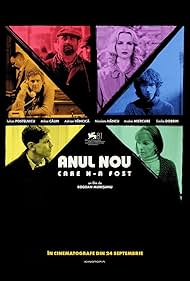Nova godina koja neće 2024 stići nikad Torrent
– by director Bogdan Muresanu
On the brink of the 1989 Romanian revolution, six lives intersect amid protests and personal struggles, leading to the explosive downfall of Ceausescu and the communist regime. ‘The New Year That Never Came’ tells the stories of the last two days of unfreedom for Romanian. It is, incredibly, the first feature film – in 50 years! A solid, mature, emotional film and a history lesson for those Romanian – unfortunately, many – who do not know or have forgotten the past of the communist dictatorship. In my opinion, in the history of Romanian cinema, it is a significant film, as is Lucian Pintilie’s ‘Reconstitution’ from 1970.
The film is set on December 20 and 21, 1989, at the end of the communist dictatorship
This was only the second film by Romania’s most important theater and film director in the second half of the 20th century. The action of ‘The New Year That Never Came’ is as dramatic as the film itself. The characters in the film, like most of those who lived through those times, have neither the feeling nor the hope that they will experience the change that will soon occur, the fall of communism that has already occurred in almost all Eastern European countries. Even when foreign radio stations announce the protests that have begun in Timisoara, nothing seems to give way in Bucharest. The Securitate secret police seem all-powerful, the propaganda machine is in full swing, life full of scarcity and dominated by fear continues.
A Securitate officer manipulates his informants who monitor the lives of students and intellectuals
He also has a mother who is about to be evicted from the house she has lived in all her life, which will be demolished to make way for grand buildings in the new city center. A television crew urgently needs to change a film in homage to the dictatorship scheduled for New Year’s Eve, in which an actress who had fled to the West appears in the foreground, in a situation reminiscent of Mungiu’s collection of short films ‘Memories of the Golden Age’. The replacement actress has a crisis of conscience when she is forced to participate in the show. A family goes into crisis when they learn that their eight-year-old son has asked the communist version of Santa Claus in a letter to see his uncle Nicu dead, ‘because that’s what his father wants’. The television director’s son plans to flee the country with a friend across the Danube, on the border with Yugoslavia.
Will the mamaliga (Romanian polenta) explode?
To the music of Ravel’s Bolero, the narrative shots alternate, the tension increases, the boiling point approaches. I found the narrative construction excellent. At first, the viewer may be a little confused by the multitude of characters and situations, but quickly the common denominator (fear, suppressed hope in the struggle against resignation, long-repressed anger) and the connections between the characters become clear. For those who lived through that period, the settings and cinematic style create a sense of immersion in the past. All the actors are formidable, but I cannot fail to mention three names: Iulian Postelnicu (who had important roles in at least three good films I saw last year), Adrian Vancica and Nicoleta Hancu.
Several of the resulting films were memorable
I found the reconstruction of those last days and hours of the dictatorship impressive, with only one major flaw related to the final scene, that of the rally in Palace Square, where a fictitious intervention in the key detail of the beginning of the protest that changed history leaves room for a revisionist interpretation. Romanian cinema has repeatedly returned, 35 years ago, to the final years of the dictatorship and even to the days when Romania’s destiny changed.




 49/36
49/36
No Comments